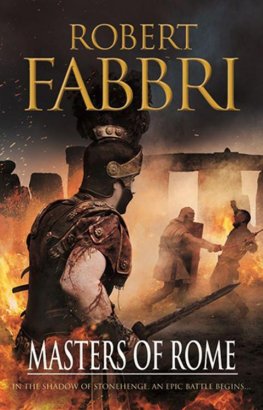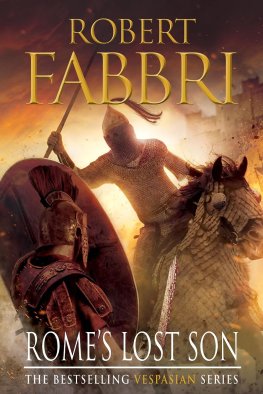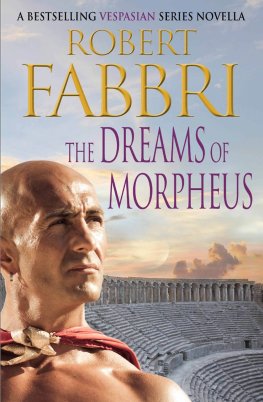Robert Fabbri - Rome’s Fallen Eagle
Here you can read online Robert Fabbri - Rome’s Fallen Eagle full text of the book (entire story) in english for free. Download pdf and epub, get meaning, cover and reviews about this ebook. year: 0101, publisher: Corvus, genre: Adventure. Description of the work, (preface) as well as reviews are available. Best literature library LitArk.com created for fans of good reading and offers a wide selection of genres:
Romance novel
Science fiction
Adventure
Detective
Science
History
Home and family
Prose
Art
Politics
Computer
Non-fiction
Religion
Business
Children
Humor
Choose a favorite category and find really read worthwhile books. Enjoy immersion in the world of imagination, feel the emotions of the characters or learn something new for yourself, make an fascinating discovery.
- Book:Rome’s Fallen Eagle
- Author:
- Publisher:Corvus
- Genre:
- Year:0101
- Rating:5 / 5
- Favourites:Add to favourites
- Your mark:
- 100
- 1
- 2
- 3
- 4
- 5
Rome’s Fallen Eagle: summary, description and annotation
We offer to read an annotation, description, summary or preface (depends on what the author of the book "Rome’s Fallen Eagle" wrote himself). If you haven't found the necessary information about the book — write in the comments, we will try to find it.
Rome’s Fallen Eagle — read online for free the complete book (whole text) full work
Below is the text of the book, divided by pages. System saving the place of the last page read, allows you to conveniently read the book "Rome’s Fallen Eagle" online for free, without having to search again every time where you left off. Put a bookmark, and you can go to the page where you finished reading at any time.
Font size:
Interval:
Bookmark:
Robert Fabbri
Romes Fallen Eagle
PROLOGUE
ROME, 24TH JANUARY AD 41
The rigid, wide-eyed grin of a gaudily painted, comicactors mask leered out at the audience; its wearer skipped a short jig, the back of his left hand pressed to his chin and his right arm outstretched. The wicked deed that causes you all this distress was my doing; I confess it.
The audience roared with laughter at this well-delivered, purposely ambiguous line, slapping their knees and clapping their hands. The actor, playing the young lover, inclined his mask-obscured head in acknowledgement of the appreciation before turning to his partner on the stage, who wore the more grotesque, gurning mask of the villain of the piece.
Before the players could continue the scene, Caligula jumped to his feet. Wait!
The ten thousand-strong audience in the temporary theatre clinging to the northern slope of the Palatine Hill turned towards the imperial box, jutting out on supporting wooden columns at the exact centre of the new construction.
Caligula copied the actors pose. Plautus would have wanted the line delivered like this. He skipped the jig perfectly whilst imitating the masks broad grin, opening his sunken eyes wide so that the whites contrasted markedly with the dark, insomniacs bags beneath them. The wicked deed that causes you all this distress was my doing;I confess it. As he finished the last syllable he brought his left hand up from his chin to rest on his forehead and melodramatically threw back his head.
The audiences mirth was even more vigorous than at the first rendition, loud and raucous but forced. The two actors held their bellies and doubled up in unrestrained hilarity. Caligula came out of the pose, a sneer on his face, and, throwing his arms wide, turned slowly to the left, then to the right to encompass the whole audience in the semi-circular construction, bathing in their adulation.
Standing at the very rear of the theatre, within the shade of one of the many awnings rigged over the precipitous seating, Titus Flavius Sabinus looked down at his Emperor with disgust from beneath a deep hood.
Caligula swept up an arm, palm towards the audience; they quietened almost instantaneously. He sat down. Continue!
As the actors obeyed his command a middle-aged man wearing a senatorial toga, seated at Caligulas feet, began to shower kisses on the young Emperors red slippers, caressing them as if they were the most beautiful objects that he had ever seen.
Sabinus turned to his companion, a pale, thin-faced, auburnhaired man in his thirties. Whos the unashamed sycophant, Clemens?
That, my dear brother-in-law, is Quintus Pomponius Secundus, this years Senior Consul, and thats as close as hell come to expressing an independent opinion whilst hes in office.
Sabinus spat and gripped the hilt of his sword, concealed beneath his cloak. The palm of his hand felt clammy. This hasnt come a moment too soon.
On the contrary, this is long overdue. My sister has been living with the shame of being raped by Caligula for over two years now; far longer than honour dictates.
Down on the stage a hearty kick by the young lover up the backside of his newly arrived slave sent him tumbling to the ground and the audience into a fresh fit of laughter that grew as the players then proceeded to chase each other around, with many trips, turns and near misses. In the imperial box Caligula gave his own demonstration of comedy running, chasing his lame uncle, Claudius, up and down, this time to the genuine amusement of the crowd, who never failed to appreciate a cripple being mocked. Even the Emperors sixteen full-bearded German Bodyguards, lined up across the rear of the box, shared in the enjoyment of the hapless mans degradation. The two Praetorian tribunes standing to either side of the enclosure made no effort to reprimand their subordinates.
Are you really going to make that buffoon emperor? Sabinus asked, raising his voice against the escalating mirth as Claudius weak legs gave out and he sprawled onto the floor.
What choice do we have? Hes the last of the adult Julio-Claudians. My men in the Praetorian Guard wont accept the restoration of the Republic; they know thatll lead to their disbandment. Theyll mutiny, kill me and any other of my officers who stand in their way; then theyll make Claudius emperor anyway.
Not if we assassinate him as well.
Clemens shook his head. I cant in honour order his death, Im his client. He indicated the two Praetorian tribunes in the box and lowered his voice as Caligula, tired of humiliating his uncle, retook his seat and the audience settled back down to watching the scheduled entertainment. Cassius Chaerea, Cornelius Sabinus and I have agreed that Claudius must become emperor: its our best hope of surviving this. Weve had discreet negotiations with his freedmen Narcissus and Pallas as well as Caligulas freedman, Callistus. Hes seen the way things are going and has thrown his lot in with the Claudius faction; theyve promised to try and protect us from any vengeance that Claudius would be honour bound to exact for killing a member of his family, even though hell be the beneficiary a very surprised one.
Claudius doesnt know yet?
Clemens raised an eyebrow. Would you trust that garrulous idiot with such a secret?
And yet you would trust him with the Empire?
Clemens shrugged.
I say he should die.
No, Sabinus, and I demand your oath to Mithras on that. We could have done this a couple of months ago but we delayed so that you could get back to Rome to strike the blow and satisfy your honour. Jupiters tight sack, Ive already exposed another conspiracy to the Emperor in order to ensure that it will be us who will have the pleasure of killing him.
Sabinus grunted his assent, well aware that he was in no position to argue. For the two years since the rape of his wife, Clementina, and his appointment as legate of the VIIII Hispana by the perpetrator of that outrage, he had been stationed with his legion on the northern frontier in the province of Pannonia, cut off from Rome. He had been forced to wait until Clementinas brother, Clemens, one of the two prefects of the Praetorian Guard, had identified a group of his officers disaffected enough with Caligulas deranged behaviour to risk their lives in an assassination attempt. This had proved to be a lengthy process as Clemens coded letters had informed him owing to his mens understandable reluctance to share treasonable thoughts; if they misjudged their confidant they would have been immediately executed.
The tipping point had come the previous year after Caligula had returned from a half-hearted punitive expedition to Germania and an aborted invasion of Britannia where the legions had refused to embark on the ships. He had humiliated them for their insubordination by making them collect seashells, which he paraded through the streets of Rome in a mock triumph. Having alienated the army he had then proceeded to do the same to the Senate and the Praetorian Guard, making himself absolutely friendless, by announcing his intention to move the Empires capital from Rome to Alexandria. This had caused consternation amongst both the officers and the nine thousand rank and file of the Guard: they feared that they would either be forced to relocate to the unpleasantly hot province of Egypt or, worse, be left behind to rot into irrelevancy so far from the Emperor who gave purpose to their existence.
United in their fears for their future, the officers had hesitantly begun to share their unease with one another. Clemens had soon been able to recruit the tribune Cassius Chaerea, whom he had long suspected of harbouring murderous intent towards the Emperor who constantly mocked his high voice. Chaerea had brought his close friend and fellow tribune Cornelius Sabinus into the plot as well as two disaffected centurions. With the conspirators finally in place, Clemens had kept his promise to Sabinus that he would be the one to strike the first blow and had written informing him that all was ready and he should return to Rome in secret; Sabinus had arrived two days earlier. Since then he had remained hidden in Clemens house; not even his brother, Vespasian, nor his uncle, Senator Gaius Pollo, whom he could see seated next to each other near the imperial box, knew of his presence in the city. Once the deed was accomplished he would return to his posting. He was confident that he could leave unnoticed and that the alibi he had given the junior officers he had left in command of his legion in winter quarters was secure: that he had been visiting his wife and two children, who were staying, out of Caligulas reach, with his parents in Aventicum in the south of Germania Superior. This way, Clemens had reasoned, if there were to be any vengeance meted out to the conspirators by the incoming regime, Clementina would just lose her brother and not her husband as well.
Font size:
Interval:
Bookmark:
Similar books «Rome’s Fallen Eagle»
Look at similar books to Rome’s Fallen Eagle. We have selected literature similar in name and meaning in the hope of providing readers with more options to find new, interesting, not yet read works.
Discussion, reviews of the book Rome’s Fallen Eagle and just readers' own opinions. Leave your comments, write what you think about the work, its meaning or the main characters. Specify what exactly you liked and what you didn't like, and why you think so.








